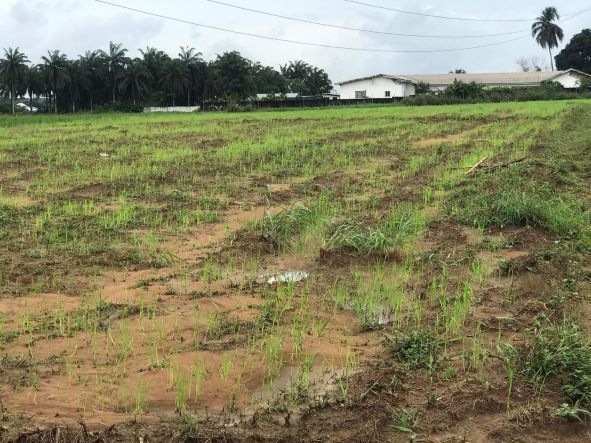As the problem of food insecurity increases in Liberia, one place to turn to for answers besides the Ministry of Agriculture is the educational institutions producing technicians in this vital field, with the state owned University of Liberia Agriculture College being the premier one.
An investigation recently conducted by a team of UL Investigative Journalism students finds that students are longing for opportunity to practicalize the theory they are learning, in the absence of an active farming program at the institution, which happens to own vast arable land in Fendell outside Monrovia and other parts. In fact, does the UL have an active farm where agricultural produce are annually harvested, not necessarily for the local market but to supply the UL Fendell campus?
Part one of this report is delving into what the reality is on the ground for the students, while a second report will later delve into the administrative explanation as to the why and why not by UL authorities.
In simple terms, it was learned that active farming is when a farmer who runs an operation and is engaged in day-to-day farming activities earn income. This can include agreements such as a joint venture with a neighbor. However, one caution is to show you are involved in management and day-to-day decisions, it is said.
How is the Agriculture theory practicalized?
From our research, the agriculture theory can be practicalized when the students understand the theory of Agriculture being taught, and then apply the collection of principles from the theory for farm production processes in order to get better agricultural products. These theories are used in agriculture to facilitate the practices of farming.
Basically, the theory is taught to give the Agricultural students an insight on soil preparation, seeds sowing, adding of manure and fertilizers to the soil, irrigation, protection of crops from weeds, harvesting, and the storage processes.
So, the Agriculture theory is practicalized when the students apply what they have learned in class, by locating a fertile land and preparing it for the sowing of the seeds, and adding fertilizer if necessary, collectively working together to protect the crops from weeds to produce a productive farm.
Is there a UL farm in Fendell? Are there livestocks being raised?
“The Agriculture College does have a farm along the college’s roadside not too far from its facilities. It is a small farm that I can see the people working on, and they have planted rice on it currently,” said Mariam Kanneh, a resident of Fendell community, something some Agriculture College students confirmed.
“They’re raising Pigs and poultry there, but for the crops I think they should have it there,” Alex Larmie, a resident of Fendell community explained.
Basically, there is a farm in the Fendell area, but from our investigation and interaction with residents and talk with students, it isn’t officially owned by the UL Agriculture College. A little backyard gardening is done, which some say ‘it’s sad to say’ that it is very small to be called the Agriculture College’s farm. Even the crops that are harvested are not enough to share with the little village on the edge of the Fendell campus.
Food insecurity in Liberia despite fertile soil and vast farmland
This report is directly based on interviews with people who are deeply into Agricultural specialization; some UL students and the team of Reporter was fortunate to only speak with a single faculty member of the Agriculture department of the University of Liberia.
Our first contact was with a junior student at the Agriculture Department, Abraham Sarmie, Jr., who told the team of the level of passion he has for the field, something that prompted to pursue a degree program in this field of study.
However, he later lamented that despite his passion for the field, his experience at the university has been 60% theory with less than 40% practical. He spoke of this as a weakness which contributes to what he called ineffectiveness of the department—not being able to provide practical materials for the students.
Another student, Esther N. Tokpa who is specializing in general agriculture, pointed out the lack of an Agricultural College farm producing crops.
She noted that despite her status, 80% of her study years have been theory. She has had the opportunity to study field crops production, crop bearings, animal production, animal nutrition, feedings, animal reproduction etc.
According to student Tokpa, she has never encountered the necessary available tools; they are either not there or not accessible to students. Therefore, she urged students with ambition to join this field of study (Agriculture) at the state-owned University to do practical on their own.
The third contact this reporting team made for an interview was a junior Agriculture student with emphasis in agriculture extension, Eric Y. Gbehgbeh.
For him, the basic studies as an agriculture student at the university is all theory, regretting with emphasis that there is no farm and tools for practical.
Student Gbehgbeh also claimed that some instructors send assistants to teach students and that the small areas seen cultivated does not belong to the University or its Agriculture department.
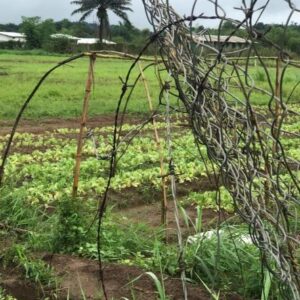
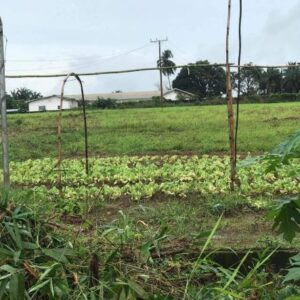
Available cabbage garden captured by our team
Despite difficulties getting hold of them, we managed to track down an Instructor at the department of Agriculture, Koivogui Daniel. Mawolo who has been teaching since 2014.
Mr. Mawolo pointed out that farmland and experiment sites that the students earlier lamented about being owed by individuals are basically operated by paid workers and basically not members of the student community. He confirmed that there is the absence of an active farm.
But he was quick to point out that the University is only into piggery as animal farming. To the contrary, what is very obvious is the presence of large number of cattle (cow) by Fulani herdsmen roaming the Fendell area. The cattle use the highly vegetated landscape for gracing purpose.
‘’There is a 15-acre and not totally occupied by agricultural purpose but preserved by the college of agriculture since abandoned by the FAO,’’ said Agriculture Instructor Mawolo. He stated that the department has tools and there is a development of tools, despite the challenges.
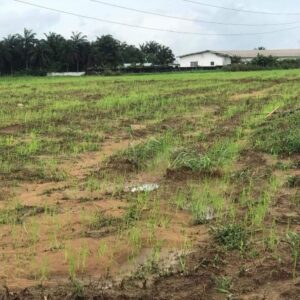
Rice farm pointed out by the instructor as was captured by our team
How does this speak to why Liberia can’t still feed itself?
Despite the stable climate and good soils for crop production, Liberia has long suffered from food insecurity worsening poverty and endemic inefficiencies in the country’s food and agricultural systems, according to Liberia Food Security Fact Sheet.
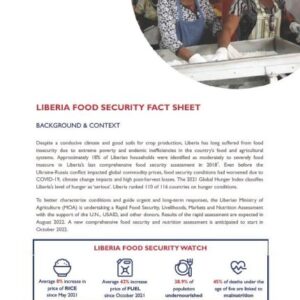
Approximately 18% of Liberian households were identified as moderately to severely food insecurity in Liberia’s last comprehensive food security assessment in 2018, USAID research findings say.
It is said that despite the Ukraine-Russia conflict impacted global commodity prices, food security conditions had worsened due to COVID-19, climate change impacts and high post-harvest losses.
Judging by what this team of Reporters gathered and saw at the UL Fendell campus, it can be said that there is a need for serious advancement in practical agriculture activities by students in the Agriculture College at the University of Liberia. There urge to get actively engaged is no doubt high.
Every day, it is becoming vividly clear why the 2021 Global Hunger Index classifies Liberia’s level of hunger as ‘serious’. Liberia ranked 110 of 116 countries on hunger conditions.
To better characterize conditions and guide urgent and long-term responses, the Liberian Ministry of Agriculture (MOA) should address these concerns at the nation’s premier state University in undertaking a Rapid Food Security Response. Students studying Agriculture are clear about their desire to see theory be matched with practice. Student Journalists Prosper K. Tamba, Goodness M. Sart, Sumoward M. Zanney and a few others contributed to this report

